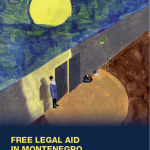
Free Legal Aid in Montenegro – Progress, Challenges and Recommendations
22/07/2025
PARENTS RECOGNIZE CIVIC EDUCATION AS KEY TO A BETTER SOCIETY AND LESS VIOLENCE
30/07/2025HUMAN RIGHTS ACTION (HRA), CENTRE FOR CIVIC EDUCATION (CCE) AND WOMEN RIGHTS CENTRE (WRC) URGE PRIME MINISTER TO WITHDRAW THE BILL ON THE AGENCY FOR NATIONAL SECURITY

Human Rights Action (HRA), the Centre for Civic Education (CCE), and the Women Rights Centre (WRC) have sent a letter to Montenegrin Prime Minister Milojko Spajić, requesting the immediate withdrawal of the Bill on the Agency for National Security (ANS) from parliamentary procedure. The organizations argue that the bill must be aligned with the Constitution and international human rights standards.
The civil society organizations (CSOs) criticized the absence of public discussion regarding the proposed solutions within the draft legislation, as well as the failure to align the bill with the Constitution and international guarantees of the right to privacy.
The draft legislation grants the ANB extensive authority to access databases without oversight—not only from state bodies and local governments but also from private entities and unspecified “other subjects.” This arrangement endangers personal data protection, placing it at the discretion of state security officials in what could be deemed an Orwellian scenario.
In April of this year, the UN Human Rights Committee explicitly stated that Montenegro must ensure a guarantee of judicial approval for accessing databases maintained by state authorities and legal entities, including banks and NGOs, under the new ANS law. However, this crucial guarantee is notably absent from the current Bill.
Additionally, the Bill proposes that the ANS be allowed to covertly collect data on users’ electronic communications, encompassing traffic and location data, as well as data on failed electronic communications. This provision was previously ruled unconstitutional by the Constitutional Court in 2014, which struck down a similar provision in Article 257, paragraph 2 of the Criminal Procedure Code (CPC). The introduction of such authority would undermine existing legal protections.
Furthermore, the Bill allows the ANB to gather data without judicial oversight by reviewing the information-communication systems of state authorities, state administration bodies, local self-governments, and private entities exercising public powers (Article 15, paragraph 5). This approach poses a significant threat to the right to privacy, permitting the ANS to inspect all electronic records—without judicial oversight—including sensitive data such as health records, social protection data, tax, and financial information. The Constitution guarantees individuals the right to personal data protection and grants them the right to be informed about the data collected about them, as well as the right to judicial protection in cases of misuse. Without judicial oversight, the realization of these constitutional rights becomes nearly impossible.
The Bill on the ANS has been categorized as urgent and is scheduled for discussion by relevant parliamentary committees on Tuesday.
Our organizations will keep international bodies monitoring the human rights situation in Montenegro informed about these developments.







 English
English